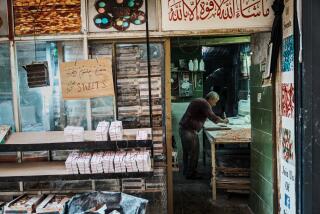Halt in Qat Supply Jangles Somali Nerves
- Share via
MOGADISHU, Somalia — Through the anarchy, war and terror that has been Somalia for two years, there has been one other constant: Every morning, the rickety wood tables at Mogadishu’s Black Sea Market were flush with little green bundles of knotty stems that are the lifeblood of many Somalis.
But Thursday, for the first time anyone here can remember, the Black Sea Market’s tables were bare. A nation went cold turkey. The culprit, in the eyes of most Somalis, was the U.S. Marine Corps.
The bundled bouquets of seemingly innocuous stems are qat (also spelled quat, khat or kat), a powerful natural stimulant that is so pervasive here in the Somali capital that many say the drug--or its absence--will help determine the success or failure of the U.S.-led military operation in Somalia.
To understand the importance of qat, a sensitive plant that is not grown in Somalia but is imported daily from neighboring Kenya, it helps to realize that throughout the past two years of lawlessness so complete that every trace of government, modern economy and justice vanished, the convoy of twin-engine qat planes never missed a single day’s delivery.
It took the uncertainty of Wednesday’s landing by U.S. Marines at Mogadishu to give Nairobi’s cowboy bush pilots, who run the lucrative qat trade from Kenya’s Wilson Airport to K-50 Airstrip 30 miles west of Mogadishu, just enough pause to stop for a day or so.
The problem is that, by most estimates, the overwhelming majority of Somali males chew qat from their early teens onward. Most are addicted to it. They pay the equivalent of $10 for a day’s supply, which is nearly 50% more than they paid two days earlier. The result is a $1-million-a-day national habit, financed mainly by trade in stolen goods, until this week the nation’s biggest growth industry.
By all accounts, the qat flight resumed late Thursday, but not until after the sudden, unprecedented absence of the drug--which spoils if not chewed within 24 to 48 hours of harvest--threw this city of 1 million into a withdrawal panic. Many Somali experts said that anxiety could quickly become anger and ultimately hostility, directed toward anyone who interferes with the qat trade.
“If the U.S. military suspends the qat trade from Wilson Airport in Nairobi, they’re going to have a real problem on their hands here,” said one veteran Western relief worker in Mogadishu. “Already, you’ve got thousands of hyped up people all going cold turkey with guns in their houses and soldiers on the street. That sounds like a security threat to me. So, I think that should give the military forces here some food for thought.”
Besides an unconfirmed report of a Marine confiscating qat from a taxi driver as a controlled substance, there were no firm indications that the U.S.-led forces called in to safeguard famine relief plan to ban the drug or stop qat flights.
But the brief and painful qat scare at the Black Sea Market this week highlighted the political and strategic importance of a single plant. And it brought into focus some of the stranger facets of life in this land, now home to almost 2,000 U.S. Marines--and soon to be occupied by 28,000 American troops.
“Why did you stop the qat trade yesterday?” a large, round-faced woman at one of the market qat stands shouted to three visiting American journalists Thursday.
As a crowd formed, an old man with teeth stained brown by decades of qat chewing chimed in. “You must not stop the qat. If we miss our qat, it will change our minds,” he concluded, his index finger making circles in the air beside his temple.
Jazzed up drivers, with qat stems dangling from their lips, careen wildly through the afternoon streets. Otherwise sedate, well-educated Somalis, while on qat, laugh at almost anything and talk about everything else. Their eyes bulged, their mouths drooped and, in the years before the Marines’ arrival disarmed most of the city, many of their trigger fingers itched with often lethal results.
John Marks, an American U.N. official in Somalia who concedes that he tried qat, described its effect as “kind of like drinking six cups of espresso. You feel a buzz, and it makes you want to talk--a lot.”
He said most Somali men believe it is qat that has helped them withstand the recent years of horror. “Somalis say that if there was no qat, it would be a lot worse,” he said. “. . . It’s not something they have to have, but it’s certainly part of the society and daily life. It’s like drinking in the United States.”
More to Read
Sign up for Essential California
The most important California stories and recommendations in your inbox every morning.
You may occasionally receive promotional content from the Los Angeles Times.











